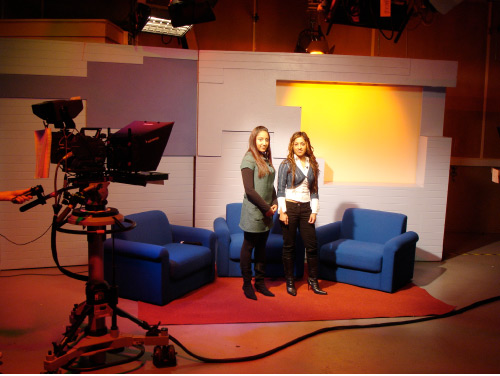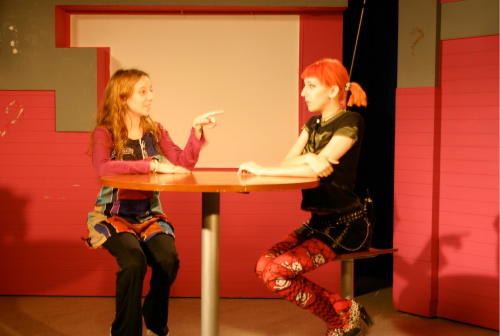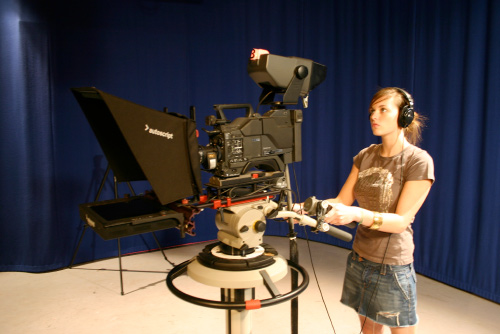Studying and Creating TV Quiz Shows
[13 to 15 week Term]
A Suggested Scheme of Work
This scheme of work is not in any way prescriptive, it is simply offered as a possible way in. It should be adapted and moulded to fit particular teachers, students and resources.
Set Up
This scheme assumes some sort of television studio facility but it can be adapted to most situations.
TV quiz shows are always set up in a television studio with at least 3 cameras, vision mixing equipment, sound and lighting.
If you have a TV studio however rudimentary then it is possible to do a quiz show.
If you have no multi camera studio facility then it is possible to make a quiz show using two or three camcorders, but there could be extensive editing, and it could be hard to get any sort of flow and continuity.
It is however not impossible and can be fun for students.
Resources

A TV studio or similar set up, or a location where a quiz can be set up and filmed.
Some petty cash for small prizes, some set dressing, duct tape, etc.
Video cameras, exterior microphones, lighting and a way of showing the score.
Week 1 Class Work An Introduction to TV Quiz Shows
Outline of course The first half of the term is research and pre-production. We are going to investigate quiz shows and make a TV studio team quiz show.
Discussion using students’ prior knowledge.
Outline conventions of quiz shows see An Introduction to Quiz Shows
Activity
Break into small groups. Each group to be given a current TV quiz show to look at and make notes about. Looking particularly at the format, type of show and audiences.
Homework
Set up idea of a student log to include all research, discussion notes, reading, internet sources, viewing log and individual comment. This can be done as part of a class blog, individual audio notes on an iPod, or even a video diary.
Week 2 Class Work - Game Show or Quiz Show?
What is the difference and how does it show on the screen. Look at a hybrid show such as QI. If suitable discuss Fiske’s distinctions between a game show and a quiz show.
Activity
One group of students examine a traditional quiz show such as BBC’s Question of Sport.
Group 2 to research a people focussed game show such as Deal or No Deal.
Another group can investigate a participatory game show such as Supermarket Sweep.
Another group could look at quizzes in children’s TV – they should be familiar with the reverse concept of a winner, where the prize is being dunked in custard or green slime or made to do a forfeit.
Week 3 Class Work - Investigate Quiz Questions Part 1
The scope, range, type and style of the questions are at the heart of a quiz show.
Activity
Look at different types of quiz questions. Discuss how answers are checked and how the class will check from at least 2 sources – Wikipedia is notoriously unreliable.
Broadcast questions and answers are checked from at least four sources.
Week 4 Class Work - Investigate Quiz Questions Part 2
Look at the importance of visual questions for a TV show. Most questions will be sourced from the internet. It is more creative for the class if they can make some of their own picture questions using digital cameras.
Teacher led discussion on copyright on photographs from the internet in educational shows. (You can use them but pictures must be referenced for original sources and logged).

Activity
Students in groups make up quiz questions and there is a cross group quiz, using only visual clues e.g. Where is this famous bridge?
Week 5 Class Work - Investigate Formats
The format makes a show distinctive. Look at the format of Who Wants to be a Millionaire?
Discuss the idea of a ‘quiz round’. Teacher led discussion with TV examples of how a ‘round’ of questions is produced, within context of the show.
Look at the different rounds used in a traditional quiz show such as sport, general knowledge, places, celebrities, what happened next, history, entertainment (TV and film), pop music, etc.
Activity
In groups students devise a format for a quiz/game show.
Homework
Each student to research a ‘round’ of questions , and choose several examples to bring in to present to class. Fill in individual logs.
Week 6 Class Work - Presentation of the student’s question rounds
Discussion on which rounds work best. Investigate scoring systems. Look at the scoring of different shows.
Activity
In groups, students to decide what sort of scoring system they would like in their show and why. They need to give reasons and be realistic for an educational situation – no money prizes as in Who Wants to be a Millionaire?
Week 7 Class Work - Discussion of a show title and the host for the class quiz show
This is the final week of research and preproduction before the show goes into production in a TV studio.
Ask the class to nominate a host or question master, and either vote for only one or have one for each group. This is a popular role and if it is decided by the teacher alone can cause jealousies etc. Set up auditions for the role within each group.
Activity
Consolidate format for your show. Prepare questions, rounds, title and decide on whether there is to be an audience and who will be the contestants.
Questions may need to be in two forms – one is on a small card for the host, and the other as a graphic if it is a picture or appears on screen.
Homework
Consolidate logs.
Week 8 Class Work - Studio Production
You have about 6 weeks to produce a 20 minute TV quiz show with 2 groups of about 8 - 10 students in each group . The amount of studio skills training will depend on the experience of the class.
You will need the next few weeks to do studio exercises in camerawork, lighting, vision mixing, sound, and use of whatever equipment is in the gallery, such as Aston and Autocue.
Activity
Set up television studio skills roles for each group – see Making a TV Quiz Show, and check individual production responsibilities are fully understood.
Week 9 Class Work - Studio Exercise 1

In studio technical skills such using cameras, lighting, etc.
Activity
I find it works well if one group do the technical skills, and the other group create a simple show that can be videoed during one session.
The groups can change round after a break or half way through.
For example group A set up a simple interview 1 + 2 situation. Group B direct it, video it, light it and shoot the 5 minute interview.
Week 10 Class Work - Studio Exercise 2 in using cameras, lighting etc. Music video.
Activity
Group A prepare a karaoke set up. A band or singers mime to a pop song in the studio. Group B light it, video and direct it as a music video.
Week 11 Class Work - Devise and Create the Quiz Show Set
Students usually like to dress and create their own studio set from whatever is available. Impress health and safety issues, but a lot can be done without a power drill and with tape and scissors. Probably all you will need to spend money on is a roll or two of duct tape.
Activity
Whole class to be involved in making and dressing the studio set. Are the two teams – depending on the show’s format to sit opposite each other with the host in the middle, or will the host go from one team to the other or is it a mastermind type situation.
Week 12 Class Work - Final week of research and preproduction before the show goes into full production in a TV studio or similar.
Activity
Light the studio set. Prepare questions, rounds, title of the show, and decide on whether there is to be an audience – if so where will they sit? The host may want a costume of some sort – resist pantomime –on the other hand ……..
Each students should have a group job and an individual one.
Homework
This is a good point to check students’ logs, and to make sure their individual logs are up to date.
Week 13 Class Work - Technical Rehearsal
Using ‘dummy contestants’ but the real hosts as they are crucial to the show running smoothly, and they must understand all technical aspects.
Activity
Make sure all the technical aspects of the show actually work – be careful to use dummy questions.
Check sound as this is often the Achilles heel of a student show. Make sure all mics work, have batteries, etc.
Rehearse lighting changes, musical links or sound FX.
Week 14 Class Work - Dress Rehearsal

Activity
This is a full run through with dummy contestants and dummy questions.
This is a rehearsal so will be a stop start affair.
This is the opportunity to check timings – some ‘rounds’ may be too long or boring – some question formats may be too difficult – does the scoring work smoothly – does the whole show come in on time?
Week 15 Class Work - TV Quiz Studio Recording Day
Activity
This is the day of the recording of the show. Friends, relatives or just the class will be geared up for the ‘live’ show. Make sure it is a real occasion.
Use lights and music to set the show up. Encourage dressing up for the occasion. Take still pictures for the school magazine, college prospectus, etc.
Don’t forget the prizes. Enjoy the day.
Later make sure all the individual logs are completed otherwise individual marks will be hard to compile.